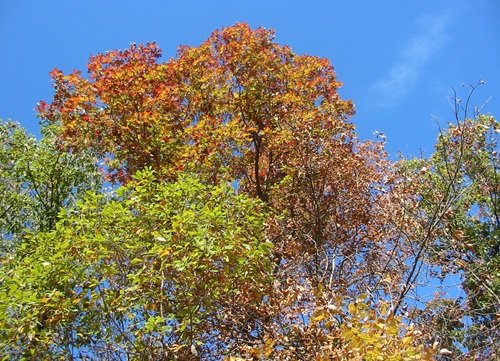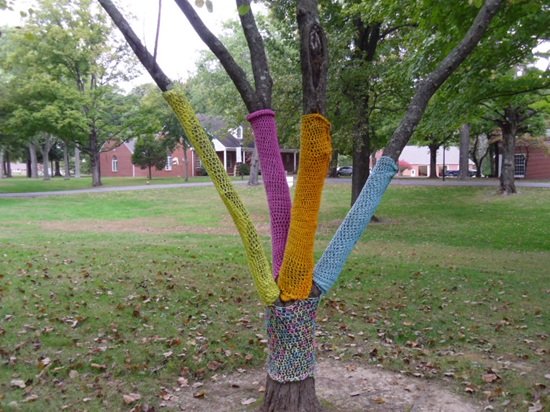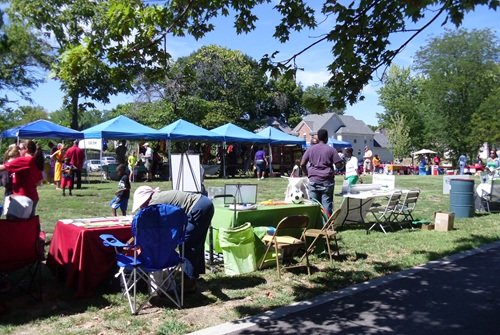| Back to Back Issues Page |
 |
|
Here's the Community News You Requested November 13, 2025 |
Please visit A Good Community: Making and Keeping One..
The weather is getting colder where many of you live, so don't your trees deserve some colorful socks? Or maybe you have sign posts or even utility poles that could show their colors, if only you could find someone with an artistic bent to knit or crochet. This is great pop-up treatment for urban parks, arts districts, and shopping areas.
Well, some of you are saying, "It's hot as blazes here in [fill in the blank]," so for you folks, it could be time to consider a hastily organized mini-festival of some sort, especially as the ripple effects of erratic federal programs have sowed some chaos here in the U.S. As this photo below shows, it doesn't take too much to have an information-oriented event. Add some live music, ethnic dancers, and a food truck or two, and all of a sudden, people want to be there. Borrow some tables, tents, folding chairs, and trash cans, and ask your social service or cultural providers to come out and share with the community.
No matter what the season though, communities need to be planning ahead, whether that is for an annual or new event a few months into the future, or whether you have more like a 20 or 100-year time horizon. Here are some of our articles to help you do just that.
1. Longer-range planning in general. Look through the image links at the community planning gateway page.
2. Medium-range planning to enhance a district or neighborhood. Figure out a new streetscape or street lighting plan, how to create or enhance a walkable community, how to devise a neighborhood plan, whether to nudge your city to start requiring registration of vacant properties, and who might sponsor one or more community murals. If you can't decide on one, it's time to learn more about how community groups should go about project selection.
3. Near-term problem solving. You could be thinking about solving a neighborhood traffic problem, preparing for a community garden, or doing your own housing condition survey if you can't get your city to do it for you. You know I wasn't going to neglect mentioning cleanups, my favorite short-term project. Here are the various types of cleanups we describe on our website: neighborhood park cleanups, large or regional park cleanups, alley cleanups, and stream cleanups.
4. Setting up new organizational capability. Think about starting a neighborhood association, a block club, a community development corporation, or a community land trust.
5. Planning the events that will bring business and residents to your area. Look at planning a street party or a neighborhood-scale parade. Maybe the goal would be a temporary makeshift park to see how the community likes it or a neighborhood tour.
As a footnote, you can and should submit 1-4 photos and a description of your event from this past summer, which gives you a web page on our site to promote. The submittal
form is near the bottom of the street parties page.
The Urban Institute has provided an excellent article about understanding the impact of the arts and cultural communities through interpreting your local data. This article contains many links to other resources on the topic, so if your community is into arts and culture, this is a must read.
For readers in small towns and rural communities, I repeat the advice to tune into what the Community Heart and Soul organization is doing, to see if you would like to become involved in their program.
You might be interested in a discussion about how community development could break down racism more forcefully. If so, see this article about
research funded by the Robert Wood Johnson Foundation. Considering the funding source, naturally health care is used as the example.
If your community is having the debate about data centers, you may be interested in this article about why data centers are important to most of us.
My own geographic community is interested in some form of community ownership as a way to increase our supply of housing that families can afford. If you are deep into similar conversations, I recommend this slightly speculative article about what it would take to make community ownership more common.
Only a few of you could probably take advantage of this story about how Paris is using a former underground parking garage to help solve the problem of how delivery trucks can simplify the "last mile" in the delivery chain. But for those of you in big cities, it could be a golden solution.
The next regular issue of Good Community Plus will arrive on a Thursday in December. Reply to this email if you have a comment about its content. For questions, remember to use the public-facing page to ask your question. I will answer them on a page that becomes viewable on our website, but your email address won't show. You can be anonymous if you wish.
If this email was forwarded to you, you can subscribe by using the green box on the bottom of almost every page of our website.
|
| Back to Back Issues Page |





